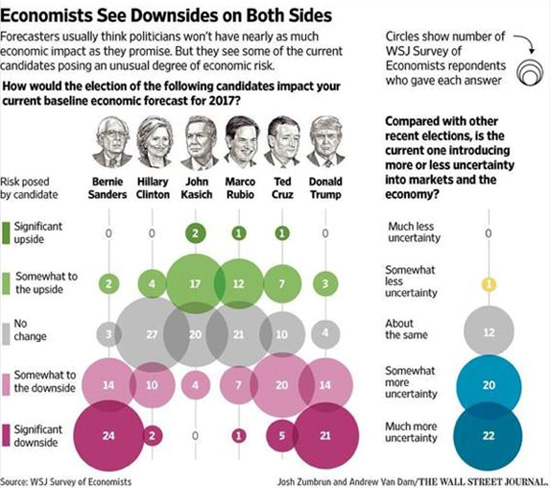 In Praise of Moderation Last week, I was sitting on the couch, goofing around on the computer, watching the primary results come in. Trump won Florida handily. Sanders wasn’t threatening to win this time, but the fact that we are even worried about this guy really speaks to the state of politics in 2016. I’m going to roll back the clock to 1986, 30 years ago, when American politics was completely different. Remember? We used to complain that Democrats and Republicans were essentially indistinguishable. After all, they used to cross the aisle frequently to vote in favor of the other party’s legislation. I would characterize both parties in 1986 as fairly centrist. I am a little bit nostalgic for those days. The cool thing about the Internet is that you get to find out that most people are basically out of their minds. Spend much time on Facebook? You get political opinions on Facebook, for sure—extreme right and extreme left. The vast majority of my Facebook friends are either closet communists or nativist Trumpkins. Nobody, and I mean absolutely nobody in between. When I was in my twenties, I thought being in between meant that you were a sellout, that if you really had any principles you would occupy an extreme position. For a period in my life, you could have called me a pretty extreme libertarian. I’ve come to view political polarization as not being a very good thing. In the eyes of 2016 voters, this would make me “establishment,” but establishment versus anti-establishment is really just code for internecine class warfare. It’s poor Republicans versus rich Republicans, and poor Democrats versus rich ones. The anti-elite sentiment is interesting, right? Because—paraphrasing a political analyst friend of mine—the notion that we would ever be governed by anyone other than our so-called elites would have been abhorrent to the Founding Fathers. But existentially speaking, I’m starting to view moderation as a virtue. A moderate political environment is best for business and markets. For years, Dennis Gartman has said that a center-right government is best for markets. Center-left works, too, if taxes are reasonable and trade is free. But when you start talking about red reactionaries or blue reactionaries, people who want to halt trade and cut off America from the outside world, economists get worried. I give economists a lot of crap, but they have this right:  Moderation is good in trading, too. It’s nice to get excited about trades. I get excited all the time. You can get too excited. I hear stories about people who go all-in on trades, 100% of the portfolio, and it always makes me shudder. I am just not that sure about anything. I am pretty sure about being short the Canadian dollar, and I have just taken a giant mark to market in the last two months. I have a theory about polarization—the Internet enhances it. It’s pretty simple. In the past, if you had an extreme point of view, it was unlikely that you were going to come in contact with someone who had that same point of view. You were isolated. Now, the extreme people can find each other on the Web and reinforce their views. 90% income tax rates is not a mainstream view. But because of Bernie, and because of the Internet, a lot of people share it. Bernie won’t be the nominee, and he’ll be too old in 2020, but I bet you that we get someone even more extreme than Bernie in 2020. And I bet the Republicans will have a candidate who is even more extreme than Trump. Because the trend toward polarization is relentless. Any candidate who got up and extolled the virtues of moderation would be laughed off the stage. So going back to the infographic, polarization is bad for the economy. And polarization is relentless. It doesn’t look good. Speaking of failed candidates, let’s take a look at Jeb Bush’s proposed tax plan (now irrelevant) from taxfoundation.org: - Consolidates the current 7 tax brackets into three, with a top marginal income tax rate of 28 percent.
- Taxes long-term capital gains and qualified dividends at a top marginal rate of 20 percent.
- Increases the standard deduction from $6,300 to $11,300 for single filers, from $12,600 to $22,600 for married joint filers, and from $9,250 to $16,750 for heads of household. The personal exemption would remain at $4,000.
- Eliminates the personal exemption phase-out (PEP) and the Pease limitation on itemized deductions.
- Eliminates the state and local income tax deduction.
- Caps all remaining itemized deductions except for the charitable deduction at 2 percent of adjusted gross income (AGI).
- Eliminates the Alternative Minimum Tax.
- Eliminates the Net Investment Income Tax of 3.8 percent, which was passed as part of the Affordable Care Act.
- Doubles the Earned Income Tax Credit (EITC) for childless filers.
- Allows second earners to file their tax returns separately.
- Exempts taxpayers over the age of 67 from the employee-side payroll tax.
- Taxes carried interest at ordinary income tax rates instead of capital gains and dividends tax rates.
- Eliminates the Estate Tax and ends stepped-up basis in capital gains for estates currently liable for the estate tax.
- Taxes all interest income at the lower capital gains and dividend tax rates.
This is what I would call an eminently reasonable tax plan. Some things, like increasing the standard deduction, doubling the EITC, and doing away with the carried interest provision are unpalatable to me. But it is reasonable. As much as I would like a flat tax of 10%, it is not reasonable. 90% taxes are not reasonable. I agree with Ted Cruz that you should send your taxes in on a postcard. That’s nice. Not going to happen. I will tell you my college yearbook quote: “Life without idealism is empty indeed. We must have hope or starve to death.”
—Pearl S. Buck And then I got old. 
Jared Dillian
Editor, The 10th Man
 Jared's premium investment service, Street Freak, is available now. Click here for our introductory offer. Jared Dillian, former head of ETF Trading at one of the biggest Wall Street firms and author of the highly acclaimed book, Street Freak: Money and Madness at Lehman Brothers, shows you how to pick and trade trends, and master your inner instincts. Learn how to use “Angry Analytics” as a leading indicator of budding trends you can profit from… and how to view any market situation through the lens of a trader. Jared’s keen insight into market psychology combined with an edgy, provocative voice make Street Freak an investment advisory like no oth er. Follow Jared on Twitter at @dailydirtnap. Share this newsletter
    http://www.mauldineconomics.com/members
Use of this content, the Mauldin Economics website, and related sites and applications is provided under the Mauldin Economics Terms & Conditions of Use. Unauthorized Disclosure Prohibited The information provided in this publication is private, privileged, and confidential information, licensed for your sole individual use as a subscriber. Mauldin Economics reserves all rights to the content of this publication and related materials. Forwarding, copying, disseminating, or distributing this report in whole or in part, including substantial quotation of any portion the publication or any release of specific investment recommendations, is strictly prohibited. Participation in such activity is grounds for immediate termination of all subscriptions of registered subscribers deemed to be involved at Mauldin Economics’ sole discretion, may violate the copyright laws of the United States, and may subject the violator to legal prosecution. Mauldin Economics reserves the right to monitor the use of this publication without disclosure by any electronic means it deems necessary and may change those means without notice at any time. If you have received this publication and are not the intended subscriber, please contact [email protected]. Disclaimers The Mauldin Economics web site, Yield Shark, Thoughts from the Frontline, Tony Sagami's Rational Bear, Stray Reflections, Outside the Box, Over My Shoulder, World Money Analyst, Street Freak, Just One Trade, Transformational Technology Alert, and Conversations are published by Mauldin Economics, LLC. Information contained in such publications is obtained from sources believed to be reliable, but its accuracy cannot be guaranteed. The information contained in such publications is not intended to constitute individual investment advice and is not designed to meet your personal financial situation. The opinions expressed in such publications are those of the publisher and are subject to change without notice. The information in such publications may become outdated and there is no obligation to update any such information. John Mauldin, Mauldin Economics, LLC and other entities in which he has an interest, employees, officers, family, and associates may from time to time have positions in the securities or commodities covered in these publications or web site. Corporate policies are in effect that attempt to avoid potential conflicts of interest and resolve conflicts of interest that do arise in a timely fashion. Mauldin Economics, LLC reserves the right to cancel any subscription at any time, and if it does so it will promptly refund to the subscriber the amount of the subscription payment previously received relating to the remaining subscription period. Cancellation of a subscription may result from any unauthorized use or reproduction or rebroadcast of any Mauldin Economics publication or website, any infringement or misappropriation of Mauldin Economics, LLC’s proprietary rights, or any other reason determined in the sole discretion of Mauldin Economics, LLC. Affiliate Notice Mauldin Economics has affiliate agreements in place that may include fee sharing. If you have a website or newsletter and would like to be considered for inclusion in the Mauldin Economics affiliate program, please go to http://affiliates.pubrm.net/signup/me. Likewise, from time to time Mauldin Economics may engage in affiliate programs offered by other companies, though corporate policy firmly dictates that such agreements will have no influence on any product or service recommendations, nor alter the pricing that would otherwise be available in absence of such an agreement. As always, it is important that you do your own due diligence before transacting any business with any firm, for any product or service. © Copyright 2016 Mauldin Economics |
